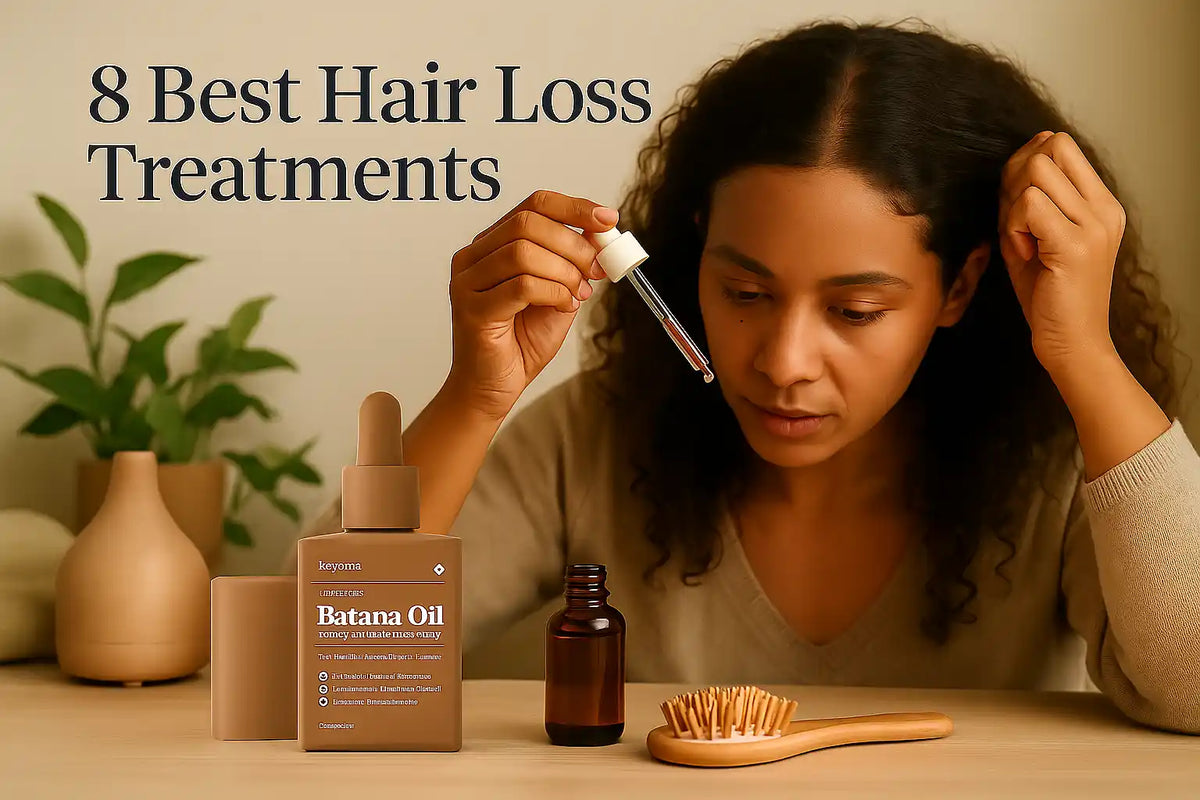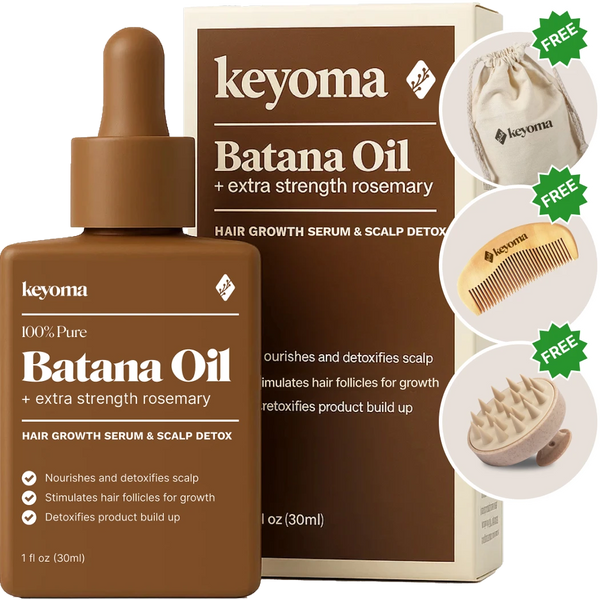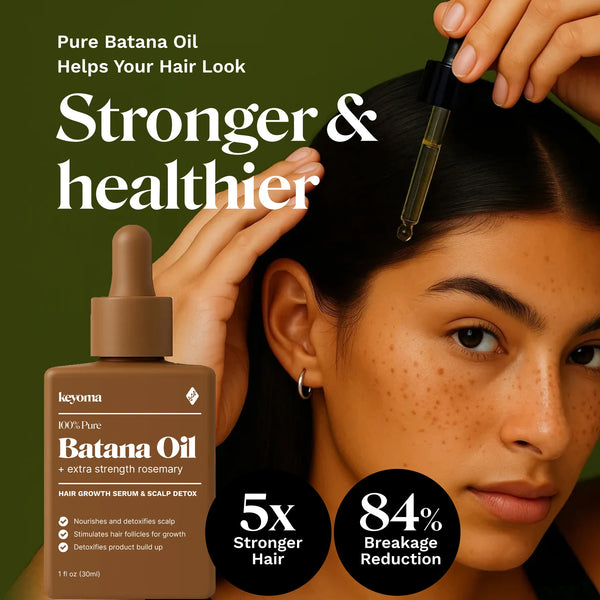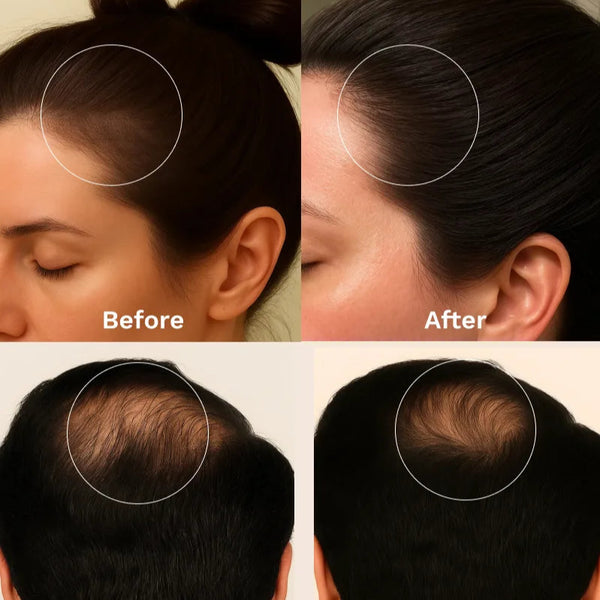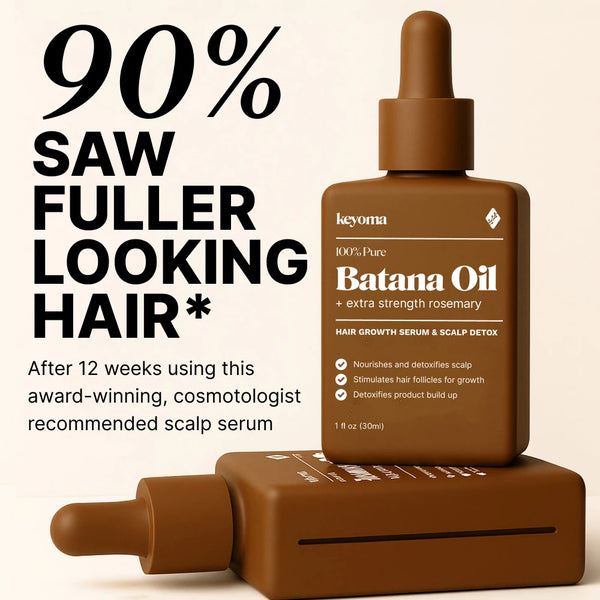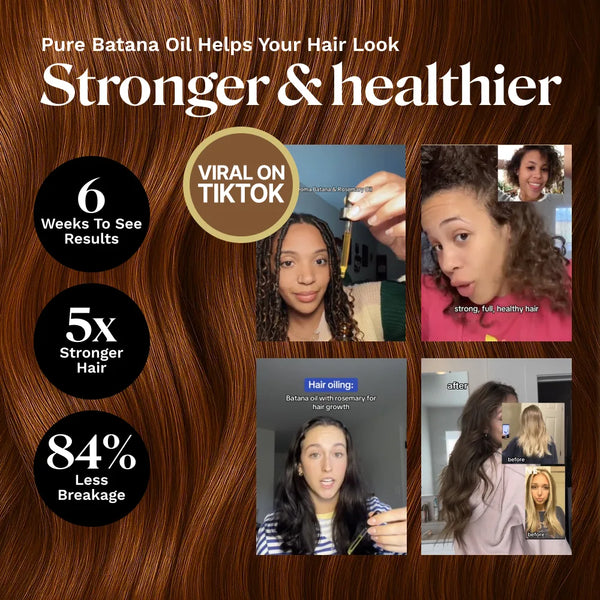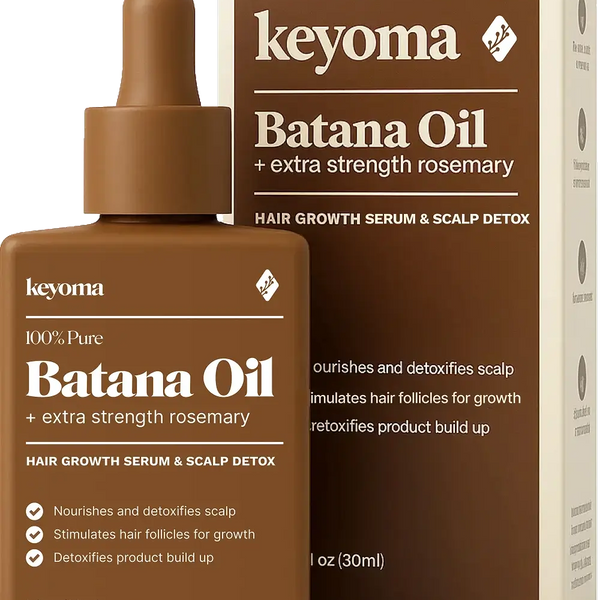In this article
We all lose some hair daily—it’s a normal part of the growth cycle.
Most of the time, that hair grows back, and you keep a full head of strands.
But things like illness, hormone shifts, stress, aging, or genetics can throw off that balance. You shed more, and new hair doesn’t always return.
To treat hair loss the right way, you need to know what’s causing it.
Seeing a board-certified dermatologist can help. They understand the many reasons behind hair loss and know how to treat each one effectively.
How Common Is Hair Loss and Who It Affects
Androgenic alopecia, or pattern baldness, is the most common form of hair loss—it impacts around 80 million people in the U.S.
Hair loss also ranks as one of the most frequent side effects of chemotherapy.
Alopecia areata, an autoimmune condition, affects nearly 6.8 million people across the country.
How Hair Loss Is Diagnosed
To figure out what’s causing your hair loss, your dermatologist starts by learning more about you.
Here’s what they’ll do:
- They’ll start by asking you a few questions—like how long you’ve noticed hair loss and whether it started suddenly.
- Next, they will check your scalp, nails, and any other areas with thinning or bald spots. This helps us spot important signs.
- Then, dermatologist will test your strands with a gentle pull. That shows how your hair is growing, how strong it is, and if it breaks easily.
If they think your hair loss might come from an illness, nutrient gap, hormone shift, or infection, we might suggest a blood test or a scalp biopsy. We can do both right in the office.
Once we have the results, we can usually explain what’s behind your hair loss.
In some cases, we may need more details—especially if more than one cause is involved. For example, you might be shedding after having a baby, but also showing early signs of hereditary thinning that aren’t as visible yet.
8 Best Hair Loss Treatment

Before starting any treatment, we’ll do a physical exam, ask about your health history, and run tests if needed. This helps us understand why you’re losing or thinning hair.
Once we find the cause, we’ll talk about your goals—like whether you want to regrow hair or stop further loss.
If we find an underlying issue causing the shedding, we’ll give you a plan to manage it. In most cases, treating that condition also helps restore your hair.
Nutrition That Supports Hair Growth
Changing what we eat can improve how our hair grows and feels.
Here are some diet shifts you can make:
Eating Enough Protein
A 2017 study found that people with hair loss often had low protein and amino acid intake. While more research is needed, protein plays a key role in supporting healthy hair.
Trying a Mediterranean-Style Diet
Research published in 2017 linked diets rich in herbs and vegetables—like those in the Mediterranean diet—to a lower risk of male pattern baldness.
Avoiding Quick-Fix Diets
Extreme low-calorie diets can rob your body of key nutrients like protein, fatty acids, and zinc—nutrients your hair needs. These diets rarely lead to lasting weight loss and often hurt hair health.
Batana Oil for Hair Growth
While there’s no clinical proof yet that Batana oil reverses or stops hair loss, many users report noticeable benefits.
Batana oil, derived from the American palm tree, is packed with vitamin E—an antioxidant known for protecting cells and reducing damage.
Vitamin E also helps moisturize, soften, and nourish your scalp. While it may not directly trigger new hair growth, it supports a healthier environment for your strands and can improve their strength, texture, and resilience.
Coconut Oil for Dry or Damaged Hair
A 2018 study found that coconut oil might help protect our hair from UV damage and harsh grooming routines.
Rubbing coconut oil into your scalp may strengthen your strands and lower the risk of breakage—but we still need more research to confirm its full effects.
Essential Oils That Support Scalp Health
Using essential oils on your scalp might help encourage hair growth.
In a 2021 study, people with female pattern hair loss saw noticeable regrowth after applying pumpkin seed oil for three months.
A 2015 trial found that rosemary oil worked as well as minoxidil when applied to the scalp regularly.
A 2020 study focused on people with central centrifugal cicatricial alopecia (CCCA), a form of scarring hair loss common among women of African descent. Several essential oils in that study showed potential for supporting regrowth.
- Rosemary oil
- Jojoba oil
- Lavender oil
- Peppermint oil
- Tea tree oil
We still need larger studies to know how well essential oils work for different types of hair loss.
Until then, you can explore them as part of your routine—but keep in mind the science is still growing.
Caffeine-Infused Products for Hair Loss
Caffeine in shampoos and conditioners might help prevent hair loss as well as minoxidil, according to a 2020 review.
It works by boosting cell activity and supporting faster growth at the root.
Antioxidants for Scalp Care
When we use shampoos or scalp treatments with antioxidants, we may see less hair loss and better scalp health.
In a 2021 clinical trial, women who applied shampoo or leave-in treatments with the antioxidant piroctone olamine for eight weeks had more hair growth and healthier scalps than those who used placebo products.
FDA-Approved Medication
You have plenty of hair loss treatments you can use at home—some you can buy over the counter, others may need a prescription.
Most of these come as creams, lotions, or shampoos you apply directly to your scalp.
Here are some common ingredients you’ll find in these topical treatments:
- Biotin
- Zinc
- Collagen
- Azelaic acid
- Oils like tea tree oil
If over-the-counter treatments haven’t helped, your healthcare provider might suggest stronger hair regrowth options like:
- Minoxidil (Rogaine): This FDA-approved topical treatment targets pattern baldness. You apply it directly to your scalp. It’s available without a prescription.
- Finasteride (Propecia): This oral medication is FDA-approved for men with pattern baldness. It’s not approved for women but works by lowering DHT levels linked to hair loss.
- Corticosteroids: These prescription meds can treat sudden or widespread hair loss. They help slow shedding and may support regrowth.
Hair Regrowth Procedures
You have several options when it comes to hair regrowth procedures and transplants. Your provider will guide you toward the one that best fits your hair loss cause and personal goals.
- Grafting involves removing healthy hair from one part of your body and relocating it to a bald area on your scalp. It’s done in your surgeon’s office under local anesthesia to prevent pain.
- Scalp reduction removes bald skin from your scalp so hair-covered areas can be stretched to cover the space. It’s mainly used for the top or back of your head—not the hairline—and can shrink a bald spot by up to 50%.
- Light therapy (low-level laser therapy) uses medical-grade light to stimulate your scalp and encourage new hair to grow. You’ll likely need several sessions to see changes.
- PRP (platelet-rich plasma) therapy involves drawing a small amount of your blood, spinning it to separate the platelets, and injecting the plasma back into your scalp. While often used for healing, PRP can also help spark new hair growth.
- Scalp micropigmentation is a non-surgical option that uses tattoos to mimic the look of hair and cover thinning or bald spots.
A 2019 review also found that temporary hair loss can happen when you lose body mass quickly—like with extreme low-calorie diets. Eating too little can affect how your hair grows.
When Hair Might Grow Back Naturally
Yes, your hair might grow back naturally—especially if you’ve recently gone through changes like:
- Given birth
- Healed from a serious illness or surgery
- Finished cancer treatments
- Lost 20 pounds or more
- Had a mild case of alopecia areata, where your immune system targets your hair follicles
- Cleared up scalp psoriasis
Your dermatologist can help you figure out if your hair is likely to regrow without treatment.
In some cases, you may need to adjust your routine or habits to see new growth.
Take Control of Hair Loss with Keyoma
If you’re trying to stop hair loss or grow your hair back, you’ve got a few options to explore.
What works best for you depends on the cause behind your hair thinning—results can vary from person to person.
Whether you’re dealing with shedding, thinning, or breakage, the right support starts with knowing the cause and choosing treatments that work with your body.
At Keyoma, we offer clean, nutrient-rich solutions like batana oil with rosemary to help you nourish your scalp, strengthen your strands, and support long-term growth.
Let’s restore your confidence—one healthy strand at a time. Start your journey with us today.
Featured Product
100% Pure Batana Oil + Rosemary
↓El mejor aceite de Batana para comprar↓
1 mes
Suscríbete y ahorra
- Suministro para 30 días entregado mensualmente $35
- 30% de descuento de por vida $6
- Kit de productos esenciales para el cuidado del cabello GRATIS $33
- Peine de madera personalizado GRATIS $10
- Masajeador de cuero cabelludo GRATIS $15
- Bolsa de viaje ecológica GRATIS $8
- Garantía de devolución de dinero de 30 días
- Envío gratis
- Portal en línea para cancelar, omitir o pausar fácilmente.
Compra única por 1 mes
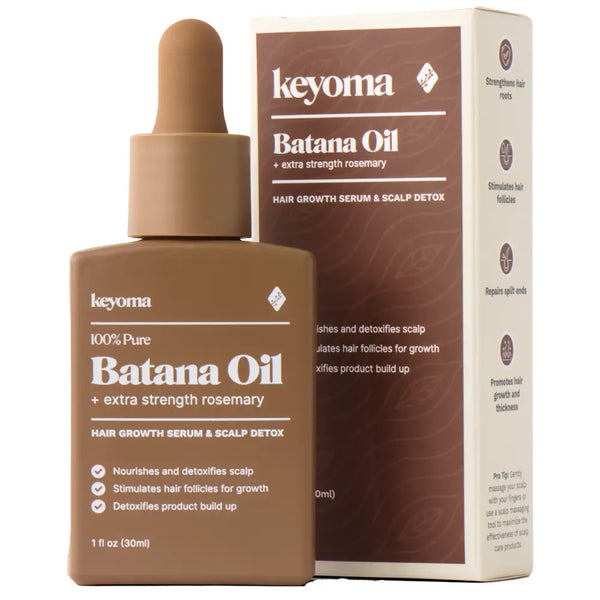
- Suministro para 30 días $50
- 30% de descuento de por vida $6
- Kit gratuito de productos esenciales para el cuidado del cabello $33
- Peine de madera personalizado gratis $10
- Masajeador de cuero cabelludo gratuito $15
- Bolsa de viaje ecológica gratis $8
Tu carrito
Su carrito está actualmente vacío
Podría gustarte...
Buscar en nuestra tienda

